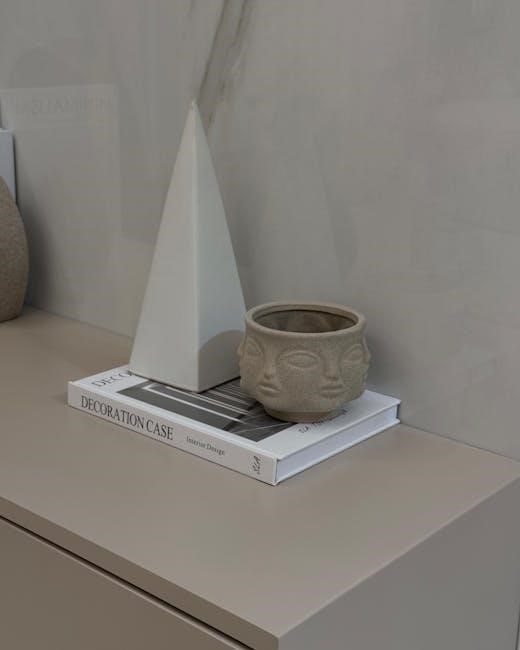
-
By:
- cierra
- No comment
the art of living book epictetus pdf
The Art of Living by Epictetus is a timeless guide offering 93 practical principles for achieving happiness and virtue. Available as a free PDF, it emphasizes inner freedom, personal responsibility, and aligning desires with nature, providing accessible wisdom for modern readers.
Overview of the Book and Its Significance
The Art of Living by Epictetus is a transformative guide that distills Stoic philosophy into 93 practical principles for achieving happiness and virtue. This timeless work, available as a free PDF, emphasizes inner freedom, personal responsibility, and aligning desires with nature. It serves as a cornerstone of Stoic thought, offering insights into moral progress and character development. The book’s significance lies in its ability to provide accessible wisdom for navigating life’s challenges with resilience and wisdom. Its enduring relevance makes it a vital resource for modern readers seeking a more intentional and virtuous life, blending Western reason with subtle Eastern influences.
The Importance of Stoic Philosophy in Modern Life
Stoic philosophy, as outlined in The Art of Living, offers timeless wisdom that resonates deeply in modern life. By focusing on inner freedom and personal responsibility, it provides a framework for navigating life’s challenges with resilience and wisdom. The emphasis on aligning desires with nature encourages a fulfilling and ethical existence. Available as a free PDF, Epictetus’ teachings remain a vital resource for those seeking mindfulness and self-reflection. The philosophy’s blend of reason and universality makes it a powerful guide for achieving happiness and virtue, fostering a more present and intentional way of living, even in today’s fast-paced world. Its enduring relevance underscores its value in modern times.

Background of Epictetus and His Teachings

Epictetus, a former slave, became a prominent Stoic philosopher. His teachings, transcribed by Arrian, emphasize personal responsibility, inner freedom, and aligning desires with nature, offering timeless wisdom for modern readers.
The Life and Legacy of Epictetus
Epictetus, born into slavery, rose to become a renowned Stoic philosopher. His teachings, recorded by his student Arrian, emphasize personal responsibility, inner freedom, and living in harmony with nature. Despite his humble beginnings, Epictetus’ wisdom gained widespread recognition, influencing thinkers like Marcus Aurelius. His legacy endures through works like the Enchiridion and Discourses, offering timeless guidance on virtue and resilience. Epictetus’ philosophy remains relevant today, inspiring modern interpretations and translations, such as Sharon Lebell’s, which highlight his enduring impact on Stoic thought and its application to everyday life.
The Role of Arrian in Preserving Epictetus’ Discourses
Arrian, a devoted student of Epictetus, played a crucial role in preserving the philosopher’s teachings. Recognizing the value of Epictetus’ oral discourses, Arrian transcribed them, creating the Discourses, a comprehensive collection of Stoic wisdom. Additionally, he compiled the Enchiridion, a concise summary of Epictetus’ principles, ensuring accessibility for future generations. Arrian’s efforts were instrumental in safeguarding Epictetus’ legacy, allowing his teachings on virtue, resilience, and inner freedom to endure. Through Arrian’s dedication, the timeless wisdom of Epictetus remains available, inspiring modern interpretations and translations, such as Sharon Lebell’s, which continue to resonate with readers worldwide.
Key Themes and Principles in “The Art of Living”
Epictetus emphasizes inner freedom, personal responsibility, and aligning desires with nature. His teachings guide readers to embrace virtue, resilience, and mindfulness for a fulfilling life.
The Concept of Inner Freedom and Personal Responsibility
Epictetus teaches that true freedom lies within, beyond external events. He emphasizes personal responsibility, urging individuals to focus on what they can control—their thoughts, actions, and reactions. By aligning desires with nature and embracing virtue, one achieves inner freedom, unshackled by external circumstances. This philosophy empowers individuals to navigate life’s challenges with resilience and wisdom. The PDF version of The Art of Living offers accessible insights into these timeless principles, guiding readers toward a life of purpose and fulfillment. Epictetus’ teachings remain a cornerstone of Stoic philosophy, encouraging self-reflection and mindfulness for modern audiences.
Aligning Desires with Nature for a Fulfilling Life
Epictetus teaches that aligning desires with nature is essential for a fulfilling life. By accepting the natural order and focusing on what lies within one’s control, individuals can achieve harmony and inner peace. This principle encourages letting go of unnecessary wants and embracing simplicity. The PDF of The Art of Living highlights how this alignment fosters resilience and wisdom in navigating life’s challenges. Epictetus’ philosophy emphasizes living in accordance with nature, a concept that transcends time, offering practical advice for modern readers seeking balance and contentment. This timeless wisdom guides individuals toward a life of purpose and ethical living.
The Role of Virtue and Happiness in Stoic Philosophy
In Stoic philosophy, virtue is the foundation of a happy life. Epictetus teaches that true happiness arises from living ethically and rationally, aligning actions with nature. Virtue is not merely a moral ideal but a practical way of being, ensuring inner peace. The PDF of The Art of Living emphasizes that happiness is not dependent on external events but on living a life of integrity. By cultivating self-awareness and mindfulness, individuals can embrace virtue, leading to a fulfilling and harmonious existence. This timeless wisdom guides readers to prioritize ethical living and find joy in living virtuously, as outlined in Epictetus’ teachings.
Structure and Content of the Book
The Art of Living features the Enchiridion, a concise summary of Epictetus’ teachings, and the Discourses, offering detailed explorations of Stoic principles. The PDF provides easy access to both.
The Enchiridion: A Concise Summary of Epictetus’ Teachings
The Enchiridion is a concise yet powerful summary of Epictetus’ teachings, presenting 93 practical principles for daily life. Modeled after military manuals, it offers bold simplicity, making it accessible even for soldiers in battle. This compact guide emphasizes personal responsibility, the alignment of desires with nature, and the pursuit of virtue. Unlike the Discourses, which explore Stoic ideas in depth, the Enchiridion provides quick, actionable wisdom. Its portability and clarity have made it a timeless resource for those seeking to navigate life’s challenges with resilience and ethical integrity. Available in PDF, it remains a cornerstone of Stoic philosophy for modern readers.
The Discourses: Elaborate Explorations of Stoic Ideas
The Discourses are a comprehensive collection of Epictetus’ teachings, offering a detailed exploration of Stoic philosophy. Transcribed by his student Arrian, these discourses provide a deeper understanding of Stoic principles, delving into the nature of the universe and ethical living. Unlike the Enchiridion, which presents concise guidelines, The Discourses elaborate on themes, offering rich discussions on morality, self-control, and the pursuit of happiness. Available in PDF, they allow readers to engage with Epictetus’ wisdom in its original, expansive form, making them a valuable resource for those seeking to immerse themselves in Stoic thought and its applications to modern life.

Practical Applications of Epictetus’ Teachings
The Art of Living offers actionable wisdom, with 93 practical principles guiding readers to navigate life’s challenges with resilience and virtue, fostering mindfulness and ethical living.
93 Practical Principles for Daily Life
Epictetus’ 93 practical principles, outlined in The Art of Living, provide a clear guide for daily life, emphasizing personal responsibility and aligning desires with nature. These principles, distilled from his teachings, offer wisdom on navigating life’s challenges with resilience and virtue. They encourage readers to focus on what they can control, fostering inner freedom and happiness. The principles are concise yet profound, making them accessible for modern readers seeking ethical and fulfilling lives. By applying these teachings, individuals can cultivate mindfulness, gratitude, and a deeper connection to their values, leading to a more intentional and virtuous existence.
How to Navigate Life’s Challenges with Wisdom and Resilience
Epictetus’ teachings in The Art of Living offer a powerful framework for navigating life’s challenges. He emphasizes that suffering arises not from events, but from our reactions to them. By focusing on what we can control and accepting what we cannot, we cultivate resilience. The principles encourage mindfulness, self-reflection, and aligning actions with virtue. This approach helps individuals face adversity with wisdom, fostering inner strength and tranquility. The guide’s practical wisdom enables readers to transform obstacles into opportunities for growth, leading to a more present and intentional life, grounded in gratitude and ethical living.
Modern Interpretations and Translations
Sharon Lebell’s modern translation of The Art of Living offers a fresh, accessible interpretation of Epictetus’ teachings, making his wisdom relevant for contemporary readers seeking moral and personal growth.
Sharon Lebell’s Modern Translation and Its Impact
Sharon Lebell’s modern translation of The Art of Living offers a fresh interpretation of Epictetus’ teachings, making his wisdom accessible to contemporary readers. Her work presents clear guidelines for moral progress and personal character development, emphasizing the importance of living a virtuous and intentional life. Lebell’s translation is praised for its clarity and relevance, bridging the gap between ancient Stoic philosophy and modern life. It has become a necessary companion for those seeking timeless insights to navigate life’s challenges with gratitude and resilience, ensuring Epictetus’ principles remain a vital guide for achieving happiness and fulfillment in today’s world.
East-West Influences in Epictetus’ Philosophy
Epictetus’ teachings in The Art of Living reflect an intriguing blend of Western and Eastern philosophical influences. While his style is distinctly Western, emphasizing reason and moral directives, there is a subtle Eastern flavor in his discussions about the universe’s nature. This unique fusion enriches his philosophy, making it universally relatable. The Western approach provides clarity and practicality, while the Eastern undertones add depth and a sense of interconnectedness. This blend has broadened the appeal of Epictetus’ ideas, allowing them to transcend cultural boundaries and resonate with diverse audiences seeking timeless wisdom for living a harmonious and virtuous life.

The Relevance of “The Art of Living” Today
The Art of Living remains a timeless guide, offering wisdom on achieving happiness and virtue. Its principles, now accessible in modern translations, continue to inspire seekers of fulfillment and inner peace in today’s fast-paced world.
Timeless Wisdom for Achieving Happiness and Virtue
The Art of Living by Epictetus offers timeless wisdom for cultivating happiness and virtue. Its teachings emphasize self-awareness, resilience, and aligning desires with nature. The book distills Stoic philosophy into 93 practical principles, providing a clear path for ethical living. Epictetus’ ideas transcend time, addressing universal human struggles with clarity and compassion. His emphasis on inner freedom and personal responsibility resonates deeply, making the text a powerful guide for modern life. The Enchiridion, a concise summary of his teachings, and the Discourses, more elaborate explorations, together form a comprehensive roadmap for achieving fulfillment and virtue in any era.
How Stoic Philosophy Can Guide Modern Life
Stoic philosophy, as presented in The Art of Living, offers a practical framework for navigating modern challenges. Epictetus’ teachings on resilience, mindfulness, and virtue provide guidance for maintaining emotional balance in a fast-paced world. His principles encourage focusing on what one can control and accepting the rest with equanimity. The emphasis on personal responsibility and ethical living aligns with contemporary values of self-awareness and intentional decision-making. By applying Stoic ideas, individuals can cultivate inner strength, reduce anxiety, and pursue a meaningful, fulfilling life. This ancient wisdom remains remarkably relevant, offering tools to thrive in today’s complex and often uncertain environment.